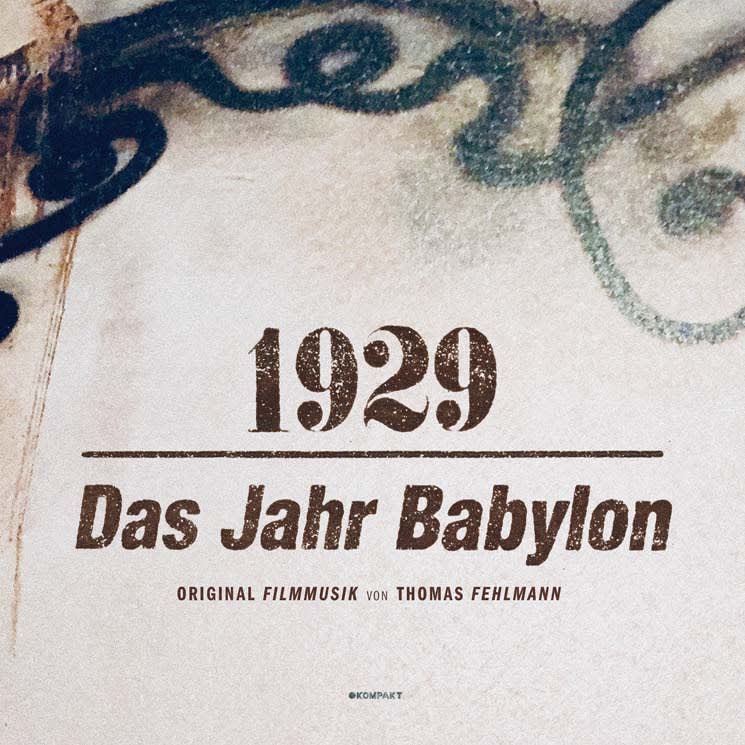Following an album he conceived as a companion to the director's 2009 marathon documentary program 24h Berlin, 2010's Gute Luft, 1929 - Das Jahr Babylon marks Thomas Fehlmann's second soundtrack commissioned for a Volker Heise documentary. While 24h Berlin followed the lives of a handful of Berliners over a one-day period, here, Heise concerns himself with the subject matter of Babylon Berlin, a German television series about life at the tail end of the Weimar Republic's so-called Golden Era.
Set in 1929, the series depicts a rowdy, overcrowded Berlin as crucible for the profoundly fragile political experiment of newfound German democracy in the midst of the world depression: Women could finally vote, and the influences of cinema, the avant-garde, and the influx of American jazz ushered in a new era of expression and culture, while the vice squad and unemployment spread disillusion. Heise's documentary unpacks the tensions with readings from diaries, memoirs, newspaper clippings, police files, and transcripts of politicians, dancers, proletarians, housewives and cocaine traders, and Fehlmann mirrors the oral history with a dizzying soundtrack that could just as easily belong to the present day.
Cutting, cutting, cutting and pasting regional, period-appropriate source material into hypnotic but nuanced repetitions, signs of modernity echo throughout Fehlmann's pulsing soundtrack, but the album flows with an unmistakable continuity. While Gute Luft offered a survey of the producer's aptitude and lacked an overt through-line, on 1929, each track adds a new layer of unease.
With a main theme that builds like a dark rendering of the fanfare in Strauss's Also Sprach Zarathustra doomed to never reach its ecstatic resolution, Fehlmann's 1929 compositions often hypnotize with the coil of an endlessly buffering software update that makes you question your sense of time and place. But he finds opportunities to cut through the anxiety with scenes of gleeful disorientation, too.
The performance takes a wonky turn for the manic mechanical cha-chunk of "Chapter D (swing)," a chugging, oscillating approximation of an industrial factory floor powered by short-breathed accordion. "Chapter M (mellow)" loads the bombastic swing of its dusty, chopped up vocal source with rocks.
Like the machine of modernity itself, it wobbles like a wheel come slightly off its axis, threatening to come loose with every pass. It's a pointedly cautionary soundtrack, but it's also a fascinating ride.
(Kompakt)Set in 1929, the series depicts a rowdy, overcrowded Berlin as crucible for the profoundly fragile political experiment of newfound German democracy in the midst of the world depression: Women could finally vote, and the influences of cinema, the avant-garde, and the influx of American jazz ushered in a new era of expression and culture, while the vice squad and unemployment spread disillusion. Heise's documentary unpacks the tensions with readings from diaries, memoirs, newspaper clippings, police files, and transcripts of politicians, dancers, proletarians, housewives and cocaine traders, and Fehlmann mirrors the oral history with a dizzying soundtrack that could just as easily belong to the present day.
Cutting, cutting, cutting and pasting regional, period-appropriate source material into hypnotic but nuanced repetitions, signs of modernity echo throughout Fehlmann's pulsing soundtrack, but the album flows with an unmistakable continuity. While Gute Luft offered a survey of the producer's aptitude and lacked an overt through-line, on 1929, each track adds a new layer of unease.
With a main theme that builds like a dark rendering of the fanfare in Strauss's Also Sprach Zarathustra doomed to never reach its ecstatic resolution, Fehlmann's 1929 compositions often hypnotize with the coil of an endlessly buffering software update that makes you question your sense of time and place. But he finds opportunities to cut through the anxiety with scenes of gleeful disorientation, too.
The performance takes a wonky turn for the manic mechanical cha-chunk of "Chapter D (swing)," a chugging, oscillating approximation of an industrial factory floor powered by short-breathed accordion. "Chapter M (mellow)" loads the bombastic swing of its dusty, chopped up vocal source with rocks.
Like the machine of modernity itself, it wobbles like a wheel come slightly off its axis, threatening to come loose with every pass. It's a pointedly cautionary soundtrack, but it's also a fascinating ride.
